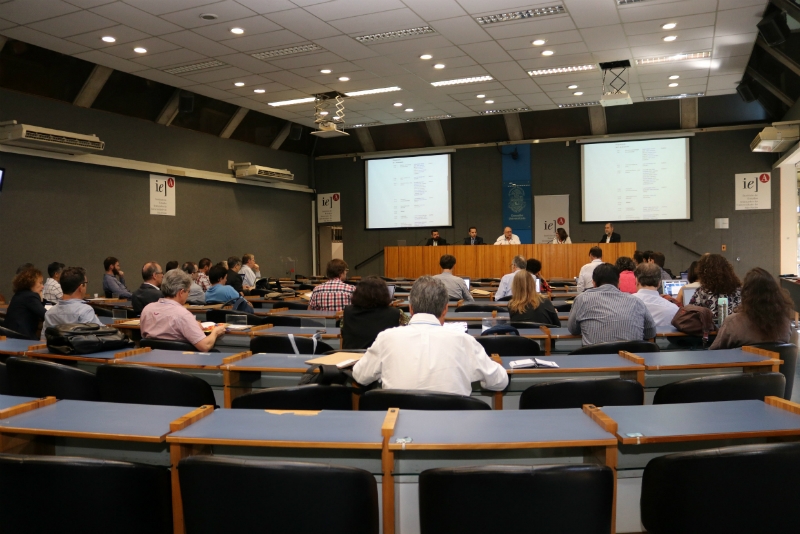The first synthesis centre for biodiversity in Latin America is opening up new potential for cooperation
(18.10.18) A world with environmental, social and economic problems increasingly calls for sustainable solutions – and cooperations between different scientific disciplines as well as the reorganisation, consolidation and synthesis of scientific data from different sources are providing solid foundations.

Audience at the workshop held at the USP Institute for Advanced Studies (IEA)
© Leonor Calasans / IEA-USP
The creation of analysis and synthesis centres plays an important role in this respect, as these centres act as an efficient tool for the evaluation and integration of data. In many cases, this allows better analysis of information in a purely regional context and creates a basis for working out effective policy measures and devising potential solutions.
By the end of this year, a consortium of Brazilian funding agencies and other national and international organisations will open a synthesis centre for biodiversity and ecosystem services (SinBiose) – marking the first initiative of this kind in Latin America. According to the Brazilian Ministry for Science, Technology, Innovation and Communication (MCTIC), R$300,000 out of the total R$1 million provided have already been released for the initial phase of the centre.
Details of the project were announced at a workshop on 24 September at the Institute for Advanced Studies (IEA) of the University of São Paulo (USP), attended by Dr. Kathrin Winkler, Head of the DFG Office Latin America, and representatives of other funding organisations from all over the world.
“The aim of the new synthesis centre is to bring together existing data from solution-oriented projects – whether for a catchment area or a city – and in this way contribute to the further development and implementation of appropriate measures,” explained the event organiser, Prof. Carlos Alfredo Joly from the Institute of Biology at the State University of Campinas (UNICAMP) and coordinator of the BIOTA programme funded by the DFG partner organisation FAPESP in the state of São Paulo.
Attending researchers presented existing synthesis centres in the USA, Canada, the UK and Germany, including the Synthesis Centre for Biodiversity Sciences (sDiv) in Leipzig. This is one of the DFG-funded research centres and in the current funding period (2012-2020) has access to €9 million a year.
Unlike the new centre being created in Brazil, sDiv does not focus primarily on solutions for social issues. “However, there must be a comprehensive concept for the projects: for example, an examination of soil biota would involve not only biologists and ecologists, but also researchers looking into geographic and soil chemistry aspects or incorporating new and previously unexploited data in analyses,” explained Prof. Marten Winter, Scientific Coordinator of sDiv.
According to Winkler, the creation of a similar centre in Brazil, funded by the DFG partner organisations CNPq and FAPESP, should open up prospects for new German-Brazilian research cooperations or possibly even for an institutional partnership between SinBiose and sDiv. “Brazil has enormous potential for biodiversity and extensive expertise in this topic. Expanding cooperation in this area would undoubtedly be of great interest to researchers from Germany.”